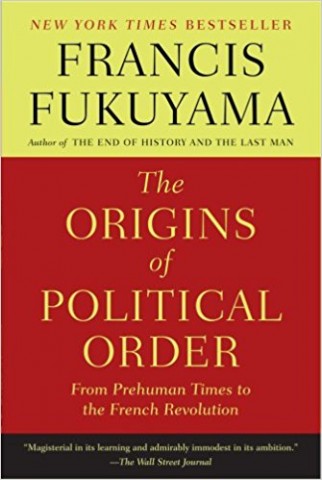Francis Fukuyama's "The Origins of Political Order" (2011) is already standard reading, and should be read by all students of development studies. For those unfamiliar with the work, it focuses on the development of government institutions. This post picks up on a few points that resonated on a recent reading:
The background: "Political institutions develop, often slowly and painfully, over time as human societies strive to organize themselves to master their environments. But political decay occurs when political systems fail to adjust to changing circumstances. There is something like a law of the conservation of institutions. Human beings are rule-following animals by nature; they are born to conform to the social norms they see around them, and they entrench those rules with often transcendent meaning and value. When the surrounding environment changes and new challenges arise, there is often a disjunction between existing institutions and present needs." (p. 7)
In agreement with a recent work on China, Fukuyama argues that a "parsimonious theory of political change, comparable to the theories of economic growth posited by economists, is in my view simply not possible. The factors driving the development of any given political institution are multiple, complex, and often dependent on accidental or contingent events." (p. 23) Again: "Social order was not, according to Hayek, the result of top-down rational planning: rather, it occurred spontaneously through the interactions of hundreds or thousands of dispersed individuals who experimented with rules, kept the ones that worked, and rejected those that didn't. The process by which social order was generated was incremental, evolutionary, and decentralized; only by making use of the local knowledge of myriads of individuals could a working "Great Society" ever appear" (p. 252). But, Fukuyama also cites examples of alternative pathways, such as conversion to Christianity or Islam, as a means to introduce rapid, sometimes top-down social order (see p. 256).
The author contrasts cultural relativism with evolutionary theory, arguing that human societies also evolve like biological evolution. ("…why one level gets superseded by another…"). While the author avoids labeling better/higher or lower/worse, the values he does chose to assess societies – complexity, richness and power – are themselves value judgements. If one society is able to wipe out another, is this a valuable metric equating with biological advancement? Similarly, if one society is able to deplete the resources of humanity rapidly and usurp the wealth of others, thereby becoming richer than others, is this a valuable metric equating with biological advancement? I am not convinced by Fukuyama's narrative on these points. I also strongly oppose the ease with which Fukuyama switches between comparisons of chimp societies and certain human societies he views as being less complex, powerful and rich, such as "Like chimp bands, hunter-gatherers inhabit a territorial range…" (p. 53).
On wealth and inequality: "There is something like an iron law of latifundia in agrarian societies that says that the rich will grow richer until they are stopped – either by the state, by peasant rebellions, or by states acting out of fear of peasant rebellions." (p. 141).
On unity: "A second perhaps more important reason by China reunified has implications for contemporary developing countries… there was a strong feeling that China was defined by a shared written language, a classical literary canon, a bureaucratic tradition, a shared history, empirewide educational institutions, and a value system that dictated elite behavior at both the political and social levels. That sense of cultural unity remained even when the state disappeared." (p. 149)
On methods: "Putting the theory after the history constitutes what I regard as the correct approach to analysis: theories ought to be inferred from facts, and not the other way around. Of course, there is no such thing as pure confrontation with facts, devoid of prior theoretical constructs. Those who think they are empirical in that fashion are deluding themselves. But all too often social science begins with an elegant theory and then searches for facts that will confirm it." (p. 24)


